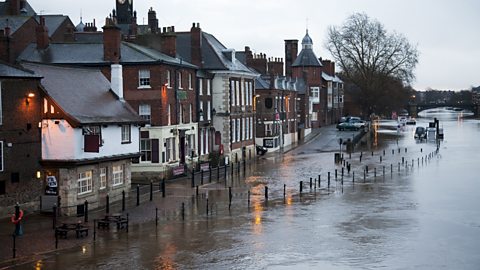Implications of climate change
Climate change can have a range of impacts in different areas. The map below shows areas presently at risk from climate change.
The Intergovernmental Panel on Climate ChangeAn organisation set up between Governments to monitor the causes, effects and management of climate change. comprises of over 1,300 scientists from around the world. They widely agree that climate change is a global issue, and estimate that atmospheric temperatures could rise by 1.4° to 5.8°C in the next 100 years, with 2°C the perceived critical level before irreversible damage and harm comes to many populations.
It is evident the effects of global climate change are very serious and it has already had observable effects on the environment.
Effects of climate change
Increased temperatures are causing ice caps to melt and consequently, polar bear habitats are shrinking
As global warming melts the world's ice caps and glaciers, this leads to an increase in sea levels, which have risen 24cm since 1880. Some scientists estimate that over the next 100 years sea levels could rise by between 10cm and 90cm, making many coastal areas around the world uninhabitable (especially on deltas), including the Shetland Islands in Scotland, the Maldives and Japan. As a result, the lives of millions of people across the globe are threatened.
An increase in sea temperatures causes the water to expand, compounding the problem of flooding and, destroys farmland and property. This means people are displaced and climate change refugees from areas such as Bangladesh move to higher ground or to other countries, exerting more pressure on resources such as housing, food and water supplies. In Bangladesh alone, more than 17 million people are threatened by flooding.
Global warming also affects weather patterns, leading to more intense heatwaves and droughts causing water shortages and crop failure, especially in vulnerable areas like the Great Plains in the USA and the Sahel in Africa. Whereas, other parts of the world experience an increase in precipitation, particularly in the winter in northern countries e.g. Scotland.
Communities that use the melt water from glaciers are seeing their water supply decrease. This is especially the case in Asia; and in South America, if the Quelccaya Ice Cap in Peru continues to melt at its current rate, it will be gone by 2100, leaving thousands of people who rely on it for drinking water and electricity without a source of either.
Global warming is also having a severe impact on wildlife and their natural habitats, e.g. some butterflies, foxes, and alpine plants have migrated to colder climates or to higher, cooler areas. Researchers have tracked the decline of the Adélie penguins in Antarctica, where their numbers have fallen from 32,000 breeding pairs to 11,000 in 30 years.
Tourism problems are increasing, as there is less snow in some mountain resorts but more heat in other areas, e.g. the Mediterranean. Meteorologists at the Met Office have predicted for Scotland milder winters, producing 50% less snow by 2080 threatening the Scottish ski industry.
As temperatures rise, tropical diseases like malaria and Yellow Fever are spreading to previously unaffected areas. Due to the change in surface temperatures and variations in rainfall patterns, there is also an increased risk of forest fires in high risk areas such as California.

In the UK, climatologist’s records show that our climate is changing with the highest temperature and rainfall levels recorded in recent years. These extremes have increased the risk of more floods, water shortages and extreme weather conditions. The results in increased insurance costs as insurers pay out more claims resulting from increasingly large or common disasters.